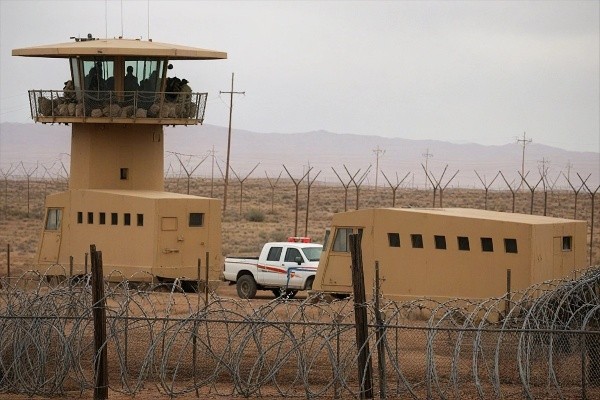Iran’s Plan to Strike Back Against the U.S.
Iran’s Military Preparations Following U.S. Attacks
Loading...

Defence contractor CACI, whose employees worked at Abu Ghraib, is ordered to pay damages after 15 years of legal delays.
Justice Served After 15-Year Legal Battle
In a significant legal victory, a U.S. federal jury has ordered the defense contractor CACI to pay $42 million to three Iraqi men who endured torture at the infamous Abu Ghraib prison. This ruling, delivered on Tuesday, marks the conclusion of a protracted 15-year legal struggle concerning the contractor's involvement in the abuses that occurred at the facility during the early years of the Iraq War.
The jury's decision holds CACI accountable for the actions of its employees, who were present at Abu Ghraib during the time of the alleged torture. Each plaintiff—Suhail Al Shimari, Salah Al-Ejaili, and Asa’ad Al-Zubae—was awarded $3 million in compensatory damages and $11 million in punitive damages, reflecting the severity of their experiences.
Testimonies of Torture and Abuse
The plaintiffs, who testified about their harrowing experiences, described a range of inhumane treatments, including beatings, sexual abuse, and forced nudity. While they did not claim that CACI's interrogators directly inflicted the abuse, they argued that the contractor was complicit in the torture by collaborating with military police to "soften up" detainees for questioning. Evidence presented during the trial included reports from retired U.S. Army generals, which documented the abuses and indicated that multiple CACI interrogators were involved in the mistreatment.
The abuses primarily occurred in late 2003, coinciding with the period when CACI employees were operating within the prison. Baher Azmy, a lawyer representing the plaintiffs from the Center for Constitutional Rights, emphasized the importance of the verdict, stating it serves as a measure of justice and accountability for the plaintiffs, who faced numerous obstacles throughout the legal process.
A Symbol of Hope and Accountability
Al-Ejaili, one of the plaintiffs and a journalist, expressed his relief and joy at the verdict, stating, “Today is a big day for me and for justice. I’ve waited a long time for this day.” He highlighted that this victory is not just for the three plaintiffs but also serves as a beacon of hope for all who have suffered oppression. The lawsuit, initially filed in 2008, faced numerous delays and attempts by CACI to dismiss the case, making this ruling particularly significant.
This trial was notable as it was the first time in two decades that a U.S. jury heard claims from Abu Ghraib survivors since the scandal erupted in 2004, when graphic images of detainee mistreatment shocked the world. Although none of the plaintiffs appeared in the infamous photographs, their accounts of torture mirrored the abuses depicted in those images.
Implications for Private Contractors
The ruling also carries broader implications for private military and security contractors. CACI had argued that it was not responsible for the detainees' mistreatment, claiming its employees had limited interaction with the plaintiffs and that any liability should fall on the U.S. government. However, the plaintiffs' legal team contended that CACI was accountable for its employees' actions, citing contractual obligations and Army regulations that mandated oversight of contractor personnel.
Katherine Gallagher, another attorney from the Center for Constitutional Rights, welcomed the verdict, stating that it sends a clear message to private contractors that they will be held accountable for violations of international law, particularly regarding torture.
As the legal battle concludes, the $42 million award not only compensates the plaintiffs for their suffering but also serves as a reminder of the need for accountability in cases of torture and abuse, reinforcing the principle that no entity is above the law.
Editor
Iran’s Military Preparations Following U.S. Attacks
Troops remain in five strategic locations, raising fears of renewed tensions and long-term occupation.
Opposition forces have taken control of the capital after a significant offensive. Here is how it unravelled.
